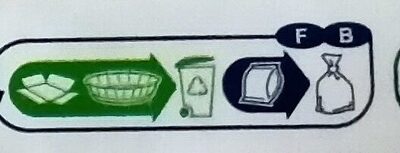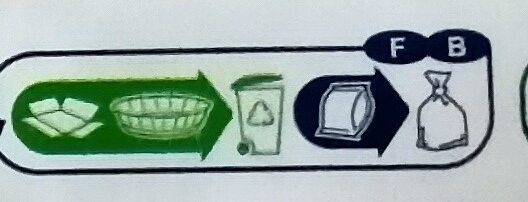Barre patissière - Simpl - 800 g
Aquesta pàgina del producte no està completa. Podeu ajudar a completar-la editant-la i afegint-hi més dades a partir de les fotos ja disponibles, o fent-ne més amb l'aplicació de androide o iPhone / iPad. Gràcies!
×
Algunes de les dades d’aquest producte les ha proporcionat directament el fabricant Carrefour.
Codi de barres: 3560070606856 (EAN / EAN-13)
Nom comú: Gâteau aux œufs frais.
Quantitat: 800 g
Empaquetament: 22 PAP, Cartó, fr:Film plastique
Categories: Snacks, Postres, Aperitius dolços, Galetes i pastissos, Pastís, Pastisseria, en:Pound Cake
Etiquetes, certificacions, premis:
Punt verd, Comptador Nutricional, Grau D NutriScore, fr:Aux-oeufs-frais
Productor: Fabriqué par/ Voir la 1ère lettre du n° de Lot: si K = EMB 29024F, sinon = EMB22136H pour Interdis
Llocs de fabricació o processament: Pâtisseries Gourmandes (Filiale Groupe Roullié) - ZI de Kervoasdoué - 29270 Carhaix-Plouguer, Finistère, Pâtisseries Gourmandes (Filiale Groupe Roullier) - ZI de Kersuguet - 22600 Loudéac, Côtes-d'Armor, Bretagne, France
Codi de traçabilitat: EMB 29024F - Carhaix-Plouguer (Finistère, France), EMB 22136H - Loudéac (Côtes-d'Armor, France), EMB 29151C - Morlaix (Finistère, France)
Botigues: Carrefour market, Carrefour, carrefour.fr
Països on es va vendre: França, Itàlia, Polònia, Romania, Espanya
Matching with your preferences
Altres dades
Altres dades: Qualité contrôlée Tous les Produits Blanc bénéficient régulièrment de contrôles qualité stricts réalisés par des laboratoires indépendants. Rajouter le code emballage fournisseur près du gencod: FLAN2520
Condicions de conservació: Conservation : À conserver à l'abri de la chaleur et de l'humidité. Pour une dégustation optimale, à consommer de préférence avant la date indiquée sur le dessus de l'emballage.
Servei al client: Interdis - TSA 91431 - 91343 MASSY Cedex - France
Report a problem
Fonts de dades
Producte afegit per jacob80
Última modificació de la pàgina del producte per yasmine69.
La pàgina del producte, també editada per carrefour, date-limite-app, didierg, driveoff, ecoscore-impact-estimator, firstpricelover, kiliweb, org-carrefour, packbot, quechoisir, roboto-app, spotter, zero.













